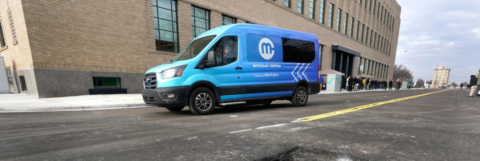Axios
Nov. 29, 2023
Joann Muller
Detroit is now home to the country’s first chunk of road that can wirelessly charge an electric vehicle (EV), whether it’s parked or moving.
Why it matters: Wireless charging on an electrified roadway could remove one of the biggest hassles of owning an EV: the need to stop and plug in regularly.
- Electrified roads could also be helpful in keeping electric buses, delivery vans, long-haul trucks and robotaxis operating around the clock.
Driving the news: Officials on Wednesday celebrated the completed installation of inductive-charging coils made by Israeli startup Electreon on a quarter-mile stretch of 14th Street in Detroit’s Michigan Central innovation district.
- The road will be used to test and perfect Electreon’s wireless-charging technology in a real-world environment before making it available to the public in the next few years.
- In 2024, Michigan will begin seeking bids to rebuild part of US-12 (Michigan Avenue), where additional inductive charging is to be installed.
How it works: When an EV equipped with an approved receiver nears the in-road charging segments, the road transfers electricity wirelessly through a magnetic field.
- The electricity is then transferred as energy to the vehicle’s battery.
- It works whether the vehicle is parked (static charging) or driving (dynamic charging).
Of note: You don’t have to worry about getting zapped by coming in contact with the pavement; it’s safe for drivers, pedestrians and wildlife, Electreon says.
Context: Electreon is one of more than 60 tech and mobility startups that are members of Detroit Newlab, an innovation hub anchored by the once-dilapidated Michigan Central train station currently under renovation by Ford.
- Its wireless charging technology is already being tested in several cities in Europe, Israel and China.
The bottom line: With the first (albeit short) electric roadway in the U.S., Detroit continues to stake its claim as America’s transportation innovation hub.

